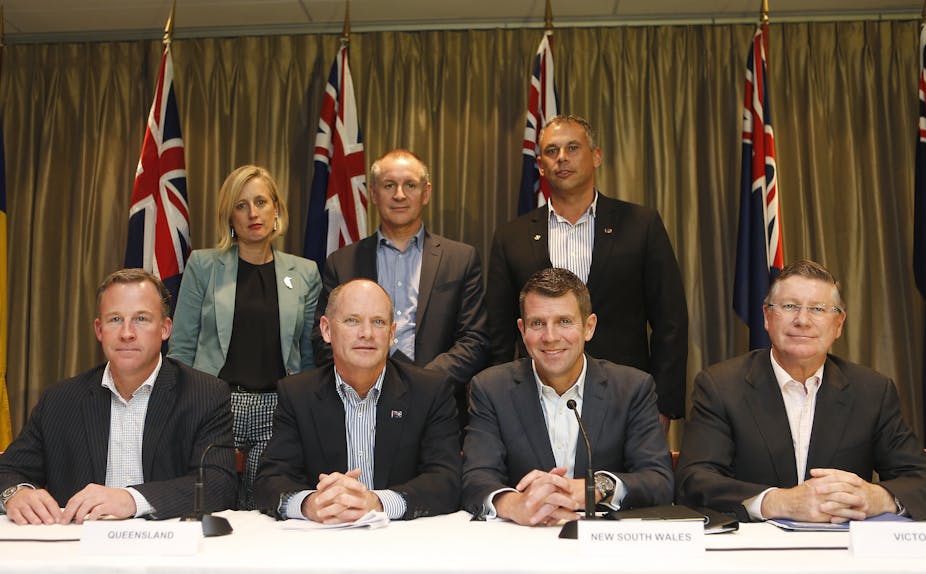Angry first ministers have flatly rejected Tony Abbott’s claim that the budget cuts will not hit states and territories immediately and again demanded he call an urgent meeting of the Council of Australian Governments.
But the Prime Minister has rebuffed this latest request for a special COAG, with a spokeswoman last night saying he had already spoken to leaders individually about their concerns and would continue to do so.
Premiers and territory chief ministers declared they were saying no to the $80 billion budget cuts and refused to canvass asking for the GST to be raised or broadened to deal with the funding problem.
After talks in Sydney attended by all leaders bar Western Australian premier Colin Barnett, they said in a communique that unilateral termination of intergovernmental agreements was unacceptable and the cuts “will cause immediate and significant impacts on the hospital system and permanent structural deterioration in the recurrent funding positions of state and territory governments”.
From July 1 there would be a reduction in funding for 1200 hospital beds across Australia and the withdrawal of over $300 million a year from concessions for pensioners and seniors.
The $80 billion cut over a decade would have a “massive impact on frontline services for all Australians”.
Abbott earlier told the ABC: “We’re not talking about next week or next month or even next year. We are talking about changes in three years’ time. We’ve got an enormous amount of time to sit down and work things out, but what we’re not going to do is continue unsustainable spending with borrowed money.”
He had the same message on 3AW: “It’s not that they’re losing money tomorrow or next week or next month or even next year – it’s three years off.”
But Queensland’s Campbell Newman said that COAG needed to meet before July 1 because “contrary to what the Prime Minister has said today, there are immediate funding impacts to frontline services”. They were not three years away.
Abbott last week rejected a call for an early COAG.
Newman said there were enough pressures on families’ cost of living to preclude talking about a tax rise. “I have a belief, and I think it is shared by the first ministers, that the federal government wants us to talk about tax increases. Sorry, we are not going there.”
NSW premier Mike Baird said the cuts could not be absorbed. They would have a “massive impact” in day-to-day delivery of services.
Victorian premier Denis Napthine said there was “apparent confusion between what the Prime Minister has said and what we are absolutely convinced is happening in our own states and territories”. This highlighted the “absolute imperative for an urgent COAG meeting to sort these matters out”.
Victoria would lose about $200 million in funding from July 1 through national partnerships being discontinued and the reduction in funding for concessions.
Also, “we need to address the potential impacts of the medium term decisions, such as the co-payment for GP services on our emergency departments,” he said.
“Of course, we need to address the fundamental concern we all have about the proposed $80 billion in cuts to health and education into the future. These are simply unaffordable, unsustainable, as far as the states are concerned, and those people who will be directly affected are ordinary Australian families.”
Jay Weatherill, one of the only two Labor leaders, said the Commonwealth had “decided to push something across the table to us. We are pushing it right back to them”. He said the federal government should abide by its agreements and “engage in a mature, constructive discussion” about the future of the nation.
He pointed out that the federal government had managed to unite state and territory governments of different complexions against the cuts.
Tasmanian premier Will Hodgman said the budget was “getting uglier by the day”.
Newman said that perhaps Abbott had not been advised of the full meaning of terminating national partnership agreements. “It means that unilaterally they have said we are not going to honour something signed in good faith.”
It was one thing if a national partnership was coming to an end. “I think what gets up everyone’s nose here is when an agreement was signed in good faith, it’s been ripped up and that can’t be allowed to continue.”
When it was put to him that this was not a trustworthy act, Newman said: “Well, I’m very disappointed in it, I’ll say that, but I guess I’m looking to see what he understands of those agreements, because I’m prepared to give him the benefit of the doubt.”
Newman asked people in his state to contact federal MPs and let them know of their concerns. He personally had been “giving a few people an earful”.
A Galaxy poll found 75% of respondents said they were worse off after the budget.
Opposition leader Bill Shorten said “even a crocodile wouldn’t swallow what Tony Abbott’s dishing up at the moment”.
“Tony Abbott keeps pretending that Australians somehow are stupid, that people hear different things. It is not the hearing of Australian voters which is the problem, Tony Abbott. It’s the fact you’re lying to them and Australians have a good memory.”
Shorten said Abbott was using cutbacks to the states as “a form of blackmail to force the states to introduce a bigger GST”.

